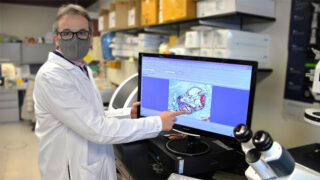Areas of Study
Metabolic diseases
Education
- Baylor College of Medicine2005Postdoctoral training
- Universitat Rovira i Virgili, Spain2000PhD
Research
The Paul lab's main interest is on the study of metabolic diseases, including diabetes and insulin resistance, but principally atherosclerosis. The lab is deeply interested in understanding the regulation of vascular sterol homeostasis, particularly how sterol storage and release in and out of lipid droplets affects foam cell biology and atherosclerosis development. We have identified novel candidate lipid droplet regulators through 1) broad transcriptomics of arterial foam cells in response to different diets, 2) proteomic analyses of lipid droplet fractions, and 3) analysis of stable and unstable regions of endarterectomy specimens.
The two main projects in the lab are:
- Regulation of foam biology and atherosclerosis development by lipid droplet-associated hydrolase (LDAH). LDAH is a novel lipase/esterase that we identified in a proteomic analysis of cholesterol-laden macrophages. Studies in human endarterectomy specimens show that LDAH's levels are reduced in unstable fragments of endarterectomy specimens. Preliminary data in transgenic and knockout models show that LDAH reduces atherosclerosis development and promotes stable lesion architectures. We are now investigating the underlying mechanisms.
- Clock modulation in circadian desynchrony induced diabetes and atherovascular disease - mechanisms and interventions. Shift workers have a much higher incidence on insulin resistance, diabetes, and atherovascular events. Unfortunately, there are no proven interventions that prevent these deleterious effects, and as a 24-hour society we cannot eliminate shift work. To understand mechanistic links between circadian derangements and cardiometabolic diseases, and to test preventive environmental (light) and pharmacological strategies for high-risk populations, we have put together an interdisciplinary team with and complementary expertise in light and circadian biology (Dr. Mariana Figueiro, Mount Sinai), molecular clock and diabetes (Dr. Vijay Yechoor, University of Pittsburgh), and atherosclerosis (Dr. Antoni Paul, Albany Medical College).
Publications
View Antoni Paul's articles on the National Institute of Health's PubMed website.
